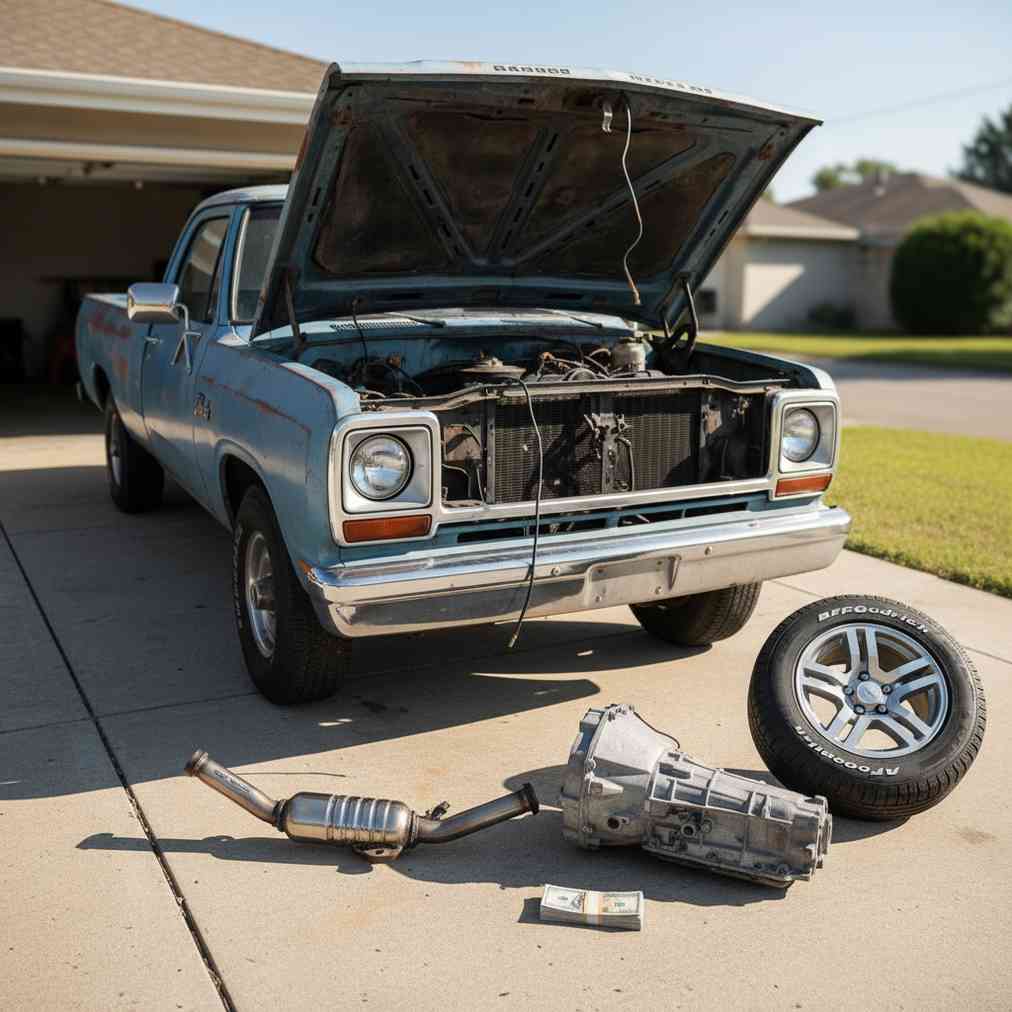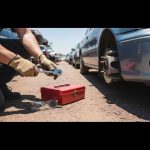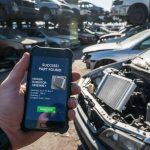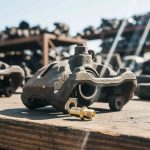Understanding the Value of a Car with a Blown Engine
A car with a blown engine may seem worthless, but it still retains significant value. Even when the engine is completely damaged, your vehicle contains numerous valuable components and materials that buyers are actively seeking. Understanding these value sources is the first step toward turning your non-running vehicle into cash.
What Makes Your Car Valuable Despite Engine Damage
The engine typically accounts for only about 20% of a car’s total value, meaning 80% of your vehicle’s worth remains intact. Several factors contribute to this remaining value:
- Valuable auto parts including transmission, alternator, catalytic converter, and wheels
- Scrap metal value from the vehicle’s steel and aluminum components
- Interior components like seats, dashboard parts, and electronics
- Body parts such as doors, fenders, and bumpers
- Glass components including windshields and windows
| Vehicle Type | Typical Cash Value Range | Key Value Factors |
|---|---|---|
| Compact Cars | $100 – $500 | Parts demand, scrap weight |
| Mid-size Sedans | $200 – $800 | Popular parts, higher metal content |
| SUVs/Trucks | $300 – $1,500 | Heavy-duty parts, more scrap metal |
| Luxury Vehicles | $400 – $2,000 | Premium parts, specialized components |
According to industry data, junk car prices in 2025 range broadly between $100 and $1,500, depending on various factors including make, model, condition, and location.
Why Selling Is Better Than Repairing
Before exploring your selling options, it’s important to understand why selling your car with engine problems often makes more financial sense than attempting repairs. Engine replacement or rebuild costs typically range from $4,000 to $7,000 or more, making it economically impractical for most vehicles.
“Professional advice highlights that repairing a blown engine is usually not financially sensible due to high parts and labor costs. Selling as junk maximizes value for most owners.”
The growing market for used auto parts ensures steady demand for components from vehicles with engine damage, making immediate sale a practical choice.
Essential Documents You’ll Need
Gathering the proper documentation is crucial for a smooth transaction when selling your junk car. Missing paperwork can delay or prevent the sale entirely.
Required Documents
- Vehicle Title – The most critical document proving legal ownership
- Valid Government-Issued ID – Driver’s license or state ID matching the title name
- Current Vehicle Registration – Helpful for verification purposes
- Lien Release – Required if there was a loan on the vehicle
- Bill of Sale – Recommended for record-keeping and legal protection
If you’ve lost your title, contact your local Department of Motor Vehicles (DMV) to obtain a duplicate before attempting to sell. Some buyers may accept alternative documentation for older vehicles, but having a clear title simplifies the process significantly.
How to Prepare Your Car for Maximum Value
Proper preparation can significantly increase the cash offer you receive for your vehicle with engine problems. Even small efforts can make a meaningful difference in your final payout.
Pre-Sale Preparation Steps
- Clean the vehicle thoroughly – Remove all personal items and debris
- Assess valuable components – Note any high-value parts in good condition
- Take detailed photos – Document both damage and valuable components
- Check fluid levels – Drain hazardous fluids if required by buyer
- Remove aftermarket additions – Consider keeping custom parts for separate sale
Being transparent about the engine damage builds trust with potential buyers and ensures smoother negotiations. Consider researching high-value auto parts that might be present in your vehicle to better understand its worth.
Best Places to Sell Your Car with a Blown Engine
Multiple options exist for selling a non-running car, each with distinct advantages and considerations. Understanding these options helps you choose the best approach for your situation.
Junk Car Buyers and Online Services
Professional junk car buying services offer the most convenient option for quick cash. These companies specialize in purchasing vehicles regardless of condition and typically provide:
- Instant online quotes – Get estimates within minutes
- Free towing services – No additional costs for vehicle pickup
- Same-day payment – Cash on the spot or quick bank transfers
- Paperwork handling – Assistance with title transfer and documentation
Popular services include Peddle and CarBrain, both offering streamlined processes for selling damaged vehicles.
Local Salvage Yards and Auto Recyclers
Local salvage operations often provide competitive offers and immediate cash payment. These businesses focus on auto recycling and parts resale, making them ideal buyers for vehicles with valuable components intact.
Benefits of working with local buyers include:
- Face-to-face negotiations
- Immediate cash transactions
- Local market knowledge
- Potential for higher offers on specific makes/models
Private Sales and Parts Sales
For those willing to invest more time and effort, selling individually or parting out the vehicle can yield higher returns. This approach works best when:
- Your vehicle has particularly valuable or rare parts
- You have mechanical knowledge and proper tools
- You can safely store and dismantle the vehicle
- You have time for multiple transactions
Consider researching demand for specific components like OEM Toyota Camry parts or Chevy Silverado transmissions to gauge potential profit from parts sales.
| Selling Method | Time Required | Effort Level | Potential Return |
|---|---|---|---|
| Online Junk Car Buyers | 1-3 days | Low | $100-$1,500 |
| Local Salvage Yards | 1-2 days | Low-Medium | $150-$1,800 |
| Private Sale (Whole Car) | 1-4 weeks | Medium | $200-$2,500 |
| Parts Sales | 2-6 months | High | $300-$4,000+ |
Getting the Best Price: Tips and Strategies
Maximizing your return requires strategic thinking and market awareness. Understanding what drives junk car values helps you negotiate better offers and choose the right buyer.
Factors That Increase Your Car’s Value
- High-demand parts – Transmissions, catalytic converters, airbags
- Vehicle weight – Heavier vehicles contain more scrap metal
- Popular make and model – Common vehicles have higher parts demand
- Current scrap metal prices – Market fluctuations affect base value
- Complete vehicle – Missing parts reduce overall value
- Location accessibility – Easy towing access may increase offers
Understanding catalytic converter values and other high-worth components helps you better assess offers from potential buyers.
Negotiation Strategies
- Get multiple quotes – Compare offers from 3-5 different buyers
- Know your car’s specifics – Year, make, model, mileage, and condition
- Highlight valuable components – Point out working parts and accessories
- Be flexible on timing – Quick sales may command premium prices
- Consider transportation costs – Factor in towing expenses if not included
Research shows that sellers who obtain multiple quotes typically receive 15-30% higher offers than those accepting the first bid.
Alternative Options: Donation and Trade-Ins
While direct cash sales typically provide the best return, alternative options may offer unique benefits depending on your circumstances.
Vehicle Donation for Tax Benefits
Donating your car to charity provides potential tax deductions while supporting worthy causes. Many charitable organizations accept vehicles with significant mechanical problems, including blown engines.
Benefits of donation include:
- Potential tax deduction based on vehicle value
- Free towing and paperwork handling
- Supporting charitable causes
- Avoiding hassle of private sales
Learn more about tax breaks when donating vehicles to determine if this option maximizes your overall benefit.
Dealership Trade-Ins
While less common for severely damaged vehicles, some dealerships accept cars with blown engines as trade-ins toward new vehicle purchases. However, expect significantly lower values compared to direct cash sales to junk car buyers.
Current Market Trends and Expert Insights
The junk car market remains robust in 2025, driven by steady demand for used auto parts and consistent scrap metal pricing. Several trends are shaping the industry:
2025 Market Trends
- Increased digitization – More buyers offering instant online quotes
- Environmental focus – Growing emphasis on proper recycling and disposal
- Parts demand surge – Rising new car prices drive used parts popularity
- Streamlined processes – Same-day pickup and payment becoming standard
- Geographic expansion – National buyers serving remote areas
“The market for junk cars remains robust in 2025, especially since scrap metal prices and demand for used parts remain steady. Experts recommend owners act quickly to sell once engine damage is confirmed, as the vehicle’s value depreciates further over time.”
Understanding these trends helps sellers time their sales for maximum value and choose buyers offering the most competitive services.
Common Mistakes to Avoid
Avoiding common pitfalls ensures you receive fair value and complete transactions smoothly. Understanding the dos and don’ts of selling junk cars prevents costly mistakes.
Critical Mistakes to Avoid
- Accepting the first offer – Always compare multiple quotes
- Ignoring paperwork requirements – Incomplete documentation delays sales
- Removing valuable parts first – May reduce overall vehicle value
- Hiding damage or problems – Transparency prevents transaction cancellations
- Forgetting personal items – Remove all belongings before pickup
- Skipping buyer verification – Ensure legitimacy of cash buyers
Research potential buyers thoroughly and read reviews before committing to any sale. Avoiding scams protects both your financial interests and legal standing.
Step-by-Step Selling Process
Follow this comprehensive process to efficiently convert your car with engine problems into cash:
Phase 1: Preparation (1-2 hours)
- Gather all required documents
- Clean vehicle and remove personal items
- Take photos of valuable components
- Research your vehicle’s specifications
- Assess market value using online tools
Phase 2: Getting Quotes (2-4 hours)
- Contact 3-5 different buyers
- Provide accurate vehicle information
- Ask about towing and payment methods
- Verify buyer credentials and reviews
- Compare offers and terms
Phase 3: Completing the Sale (1-3 days)
- Schedule pickup with chosen buyer
- Prepare final paperwork
- Ensure clear access for towing
- Complete transaction and receive payment
- Transfer title and receive receipt
For those interested in learning more about the automotive industry, explore how auto salvage yards operate to better understand the buyer’s perspective.
Legal and Environmental Considerations
Responsible disposal of vehicles with engine damage involves several legal and environmental factors that sellers must consider.
Legal Requirements
- Proper title transfer – Complete all required documentation
- Lien clearance – Resolve any outstanding loans or liens
- Registration cancellation – Notify DMV of vehicle disposal
- Insurance notification – Cancel coverage after sale completion
- Emission compliance – Some areas require proper disposal certificates
Environmental Responsibility
Choose buyers who follow proper environmental protocols for vehicle disposal and recycling. Responsible auto recyclers ensure:
- Safe removal and disposal of hazardous fluids
- Proper recycling of metal and plastic components
- Appropriate handling of electronic components
- Compliance with local environmental regulations
Understanding the benefits of auto parts recycling highlights the positive environmental impact of selling your damaged vehicle to legitimate recyclers.
Final Thoughts: Maximizing Your Return
Successfully selling a car with a blown engine requires strategic planning, proper documentation, and market knowledge. While engine damage significantly impacts value, numerous opportunities exist to extract meaningful cash from your non-running vehicle.
Remember these key strategies:
- Act quickly – Vehicle values decrease over time
- Compare multiple offers – Competition drives better prices
- Maintain transparency – Honest disclosure prevents problems
- Choose reputable buyers – Verify credentials and read reviews
- Consider all options – Cash sale, donation, or parts sale
Whether you choose to work with established junk car buyers or explore local salvage options, proper preparation and market knowledge ensure you receive fair compensation for your vehicle’s remaining value.
For additional guidance on automotive topics, visit our comprehensive automotive blog for expert insights and practical advice on vehicle maintenance, parts sourcing, and automotive industry trends.





Leave a Reply
You must be logged in to post a comment.